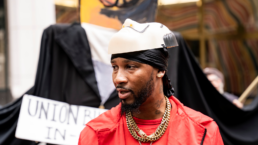Black labor organizers have long recognized that better conditions for Black and brown workers result in better conditions for everyone.
By Anna Gifty Opoku-Agyeman and Katie Camacho Orona, Teen Vogue
On April 1, 2022, Jeff Bezos received some news that he wished was an April Fools’ joke: Amazon warehouse workers in Staten Island won their vote to create a union, beating the odds and making history in the process. The face of the “Shut Down Amazon” movement, a working-class Black man named Christian Smalls, is building on the legacy of Black labor leaders whose efforts define generations.
While there are countless articles profiling Smalls, few have acknowledged the long history of Black labor leaders taking the helm of workers’ rights movements. Smalls, who was subjected to a smear campaign by Amazon and dismissed as “not smart or articulate” by company leaders, is reminiscent of a lineage of Black American labor organizers and scholars who have always recognized the liberation of all workers begins with the Black worker.

African Americans have participated in labor activity since before the Civil War, as documented by the National Archives. Like many American institutions in the century following that war, organized labor often excluded or marginalized Black people, despite workers’ shared interest in advocating for better conditions, especially in occupations that failed to dignify their labor.
During The Great Migration of 1916 to 1960, millions of African Americans relocated from the South to the Northeast and Midwest in pursuit of employment in industries including steel, automotive, shipbuilding, and meatpacking. Yet these gains occurred alongside the government’s refusal to extend rights to many workers of color. In 1938, Congress passed the Fair Labor Standards Act (FLSA), a landmark piece of legislation enshrining protections for workers, yet it excluded domestic, agricultural, and tipped workers, purposefully denying many Black and brown people the same rights and protections given to white workers. Additionally, according to the National Employment Law Project, “Nearly half of all Black men, Mexican American men, and Native American men and women…were excluded from Social Security, unemployment insurance, and the right to organize” in the National Labor Relations Act of 1935. The effects of this exclusion fell disproportionately on Black women because of their concentration in agriculture and domestic work. Perhaps this is why the first Black woman economist in the U.S., Dr. Sadie Tanner Mossell Alexander, focused her dissertation on the economic outcomes of families that participated in The Great Migration. She also advocated for recentering the economy on Black women workers as one way to promote economic growth and progress for the Black community.
Recent Posts
‘Unconstitutional. Unethical. Authoritarian.’ ICE Bars Millions Of Immigrants From Bond Hearings
July 18, 2025
Take Action Now One watchdog said the new policy “seems like a blatant attempt to stop them from exercising their right to due process.”……
Americans Are Not Nearly Alarmed Enough About Climate Change
July 18, 2025
Take Action Now Americans still don’t comprehend how imminent, dangerous, and far-reaching the threat is—and journalists are partly to blame.By…
The IRS Is Building A Vast System To Share Millions Of Taxpayers’ Data With ICE
July 17, 2025
Take Action Now ProPublica has obtained the blueprint for the Trump administration’s unprecedented plan to turn over IRS records to Homeland Security…
Israel’s Sudden Assault On Syria Is Unchecked Aggression
July 17, 2025
Take Action Now Jerusalem is bombing Damascus and threatening al-Sharaa’s rule, while Washington was hoping to help the nascent government on…




